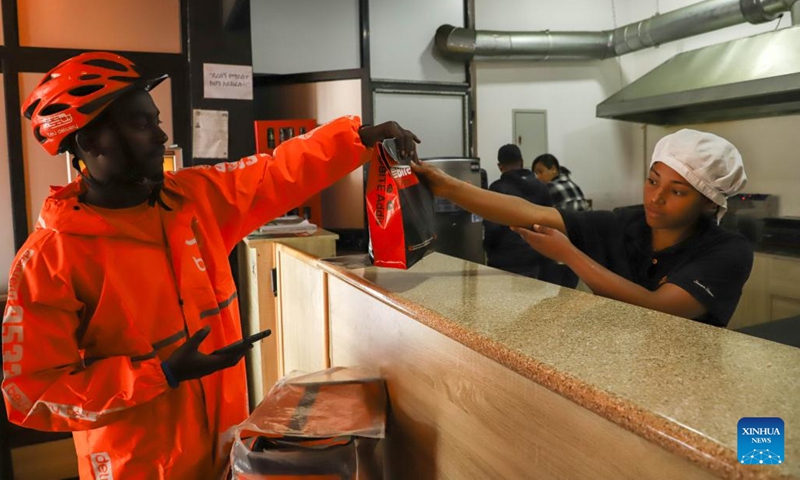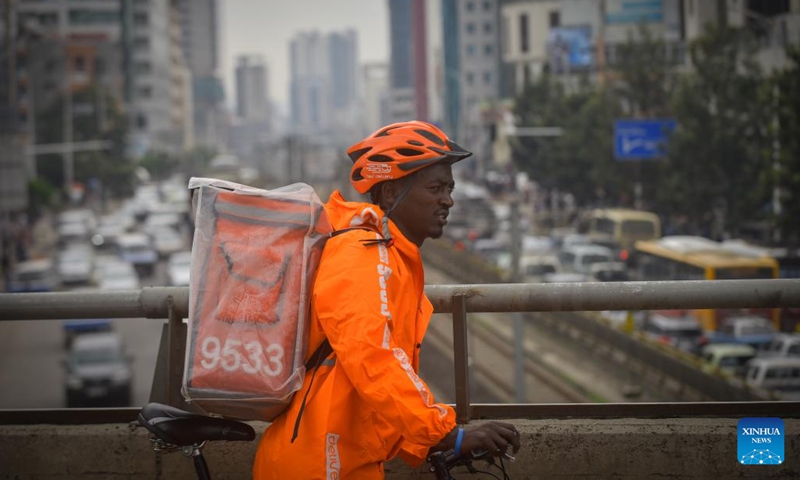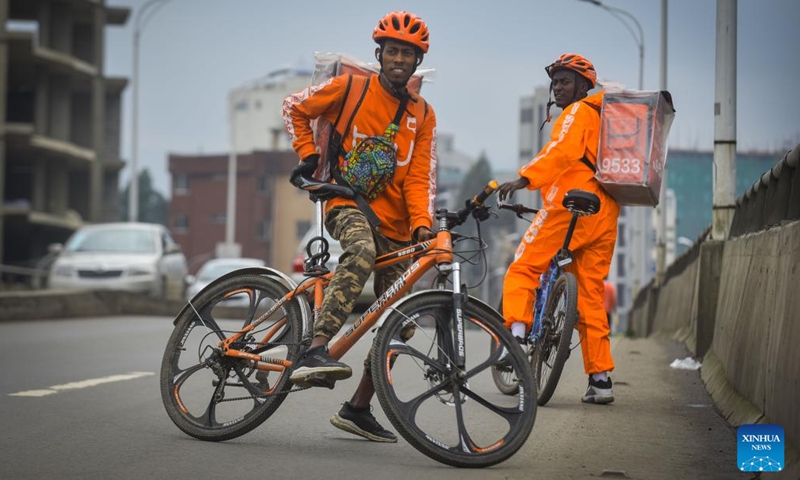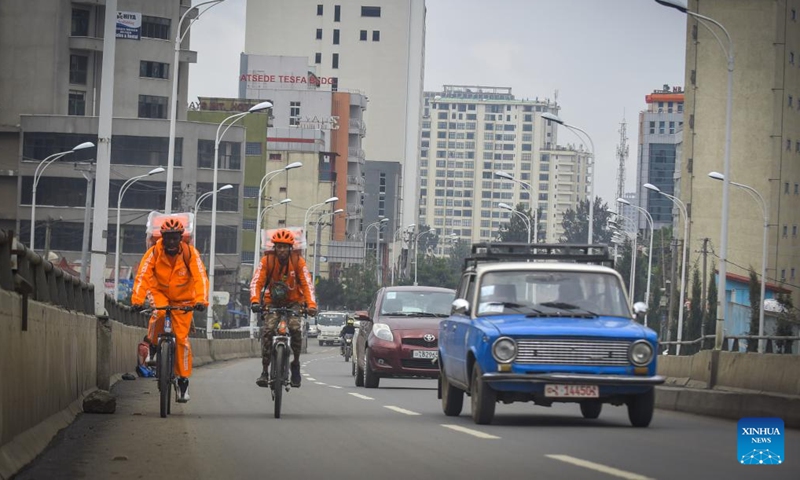
Asnake Nigussie, a bicycle rider working for beU delivery, takes food from a restaurant in Addis Ababa, Ethiopia, on July 19, 2022.(Photo: Xinhua)

Asnake Nigussie, a bicycle rider working for beU delivery, delivers food in Addis Ababa, Ethiopia, on July 19, 2022.(Photo: Xinhua)

Asnake Nigussie and Melaku Desalegn, bicycle riders working for beU delivery, deliver food in Addis Ababa, Ethiopia, on July 19, 2022.(Photo: Xinhua)

Asnake Nigussie and Melaku Desalegn, bicycle riders working for beU delivery, deliver food in Addis Ababa, Ethiopia, on July 19, 2022.(Photo: Xinhua)
On a typical sunny day in Addis Ababa, the capital of Ethiopia, Asnake Nigussie, wearing an orange uniform and a backpack, was racing on a bicycle to pick a package of food from a nearby restaurant that was ordered online minutes before.
Nigussie and his fellows, some 400 youngsters, have lately created a swarm of orange backpack-bikers roaming Addis Ababa, eventually transforming food delivery in the city.
They work for beU delivery, a Chinese-invested on-demand food delivery service provider within a short span of time, serving Addis Ababa residents with their favorite food from almost all major restaurants all over the city.
"I used to ride a bicycle just for fun and I never expected I would be able to get a job with it. To be honest, I was even surprised when I first heard about food delivery job opportunities for people with good bicycle riding skills," said Nigussie. "I immediately applied and started working here." Nigussie has been working as a backpack-biker for about eight months.
BeU delivery, founded in June 2021, works with pre-orders from its customers both via its flagship service app while also through communications from a call center. Customers can also track the status of the food they ordered before it is delivered by one of the 400 backpack-bikers within an average time of 30 to 45 minutes.
It applies a combination of technology and innovative ideas to streamline its food delivery services.
Zheng Hao, beU delivery founder and chief executive officer, attributed the motive behind its formation to a significant demand for a viable food delivery platform in Ethiopia and across the African continent.
She asserted that beU delivery is a brand meant for all people living in different economic statuses.
"We did not want an exclusive market for exclusive people," Zheng told Xinhua. "So we set out to penetrate the entire market."
"Our delivery time would not be affected by traffic jams and our delivery fee is not affected by gas prices because we mostly use bicycles instead of motorcycles or cars," she said.
Delivery service is relatively a new venture in Ethiopia, Africa's second most populous nation, with a growing number of recently established companies vying to penetrate the untapped market, mainly in the capital of Addis Ababa and its surroundings.
Zheng believed that beU delivery's eco-friendly approach has made the food delivery fee affordable along with swift delivery with the provision of exclusive food items. "All this sets us apart from our competitors," she said.
"The growth rate was quite impressive. It was obvious that beU would be a profitable and sustainable service," said Zheng.
"We want to be the customer's first choice food delivery app. Our target is to become Africa's number one food delivery service in two years," Zheng said, as she emphasized beU is aiming to become a super app covering online to offline (O2O) services.
Birhan Gebremedhin, a restaurant owner partnering with beU delivery, singled out the maximum assurance, delivery speed and constantly growing customer base as a distinguished quality in working with the delivery platform.
"We have been working with beU for almost a year now. I am happy that, with the help of beU, I am now reaching a far greater people irrespective of the geographical limitations we had," Gebremedhin said. "I could say on average I receive between 100 to 150 food order calls from beU per day. I often receive positive feedback from my customers about their service as they get their preferred food wherever they are via beU."
BeU delivery is successfully addressing the common assumption in Ethiopia and elsewhere in Africa that often associate delivery service as a luxury undertaking left for the elite, which could be aligned with the continent's clear social gap between the rich and the poor.
Beteab Fisha, another restaurant owner, stressed that beU's smooth delivery service gave his restaurant a great advantage to easily reach out to target customers.
Fikreab Habte, a beU delivery department manager, said as beU grows big, it is also creating more opportunities for its employees across various sections.
"What makes (beU delivery) unique is that it is full of young talent. It gives freedom and a creative environment for these young people to work freely and exceed their limits," Habte said. "In the next five years, I would see beU to be one of the Amazon-size big companies that have dominated the whole Africa."
Melaku Desalegn, another bicycle rider who has been working with the company for close to one year, said the rare opportunity enabled him to be productive and help his family financially.
"I get a very good salary and I also often get bonus payments for my outstanding work. In addition to meeting my family's financial needs, I am also saving a portion of my earnings for a better future," he said.
BeU delivery had recently secured a multi-million dollar seed round of financing led by Y Combinator, Goodwater Capital and Ethiopian angel investor Addis Alemayehou, which will be used for market expansion and technology development.
BeU delivery plans to expand its business to Tanzania and Uganda this year, while also further improving its existing ordering and distribution system and optimize the management system.
Africa's food delivery business, just like the entire e-commerce industry, is yet to fully develop as compared with the rest of the world, essentially due to challenges mainly attributed to internet connectivity, payment gateways as well as logistics barriers.
According to figures from the UN Economic Commission for Africa, Kenya, Mauritius, Namibia and South Africa were the only African countries where the share of online shoppers exceeds 8 percent of their respective population. In most other countries, it is below 5 percent.
